Election
| |||||||||||||||||||||
| |||||||||||||||||||||
| |||||||||||||||||||||
The 1860 Massachusetts gubernatorial election was held on November 6. Incumbent Republican Governor Nathaniel Banks did not run for re-election to a fourth term. He was succeeded by Republican John Albion Andrew, a radical abolitionist.
| |||||||||||||||||||||
| |||||||||||||||||||||
| |||||||||||||||||||||
| Elections in Massachusetts |
|---|
 |
The 1860 Massachusetts gubernatorial election was held on November 6. Incumbent Republican Governor Nathaniel Banks did not run for re-election to a fourth term. He was succeeded by Republican John Albion Andrew, a radical abolitionist.
Incumbent governor Nathaniel Banks, a moderate on the slavery issue, supported Congressman Henry L. Dawes as his successor. To give Dawes the greatest possible advantage at the state convention, Banks delayed his retirement announcement as long as possible. However, party chairman William Claflin leaked the news to U.S. Senator Charles Sumner, an abolitionist and supporter of John Albion Andrew. Sumner sprang the Andrew campaign into gear before Banks announced his retirement, allowing them to get the jump on Dawes. [1]
Two additional candidates joined the race: Ensign H. Kellogg and John Z. Goodrich. Both hailed from Berkshire County, like Dawes, and their campaigns may have eaten into his regional support there. By the time the convention opened, Andrew was the strong favorite. [2]
The Republican State Convention was held in Worcester on August 29.
| Party | Candidate | Votes | % | |
|---|---|---|---|---|
| Republican | John Albion Andrew | 733 | 68.50% | |
| Republican | Henry L. Dawes | 326 | 30.47% | |
| Republican | Ensign Kellogg | 7 | 0.65% | |
| Republican | John Z. Goodrich | 4 | 0.37% | |
| Total votes | 1,070 | 100.00% | ||
| Party | Candidate | Votes | % | ±% | |
|---|---|---|---|---|---|
| Republican | John Albion Andrew | 104,527 | 61.63% | ||
| Democratic | Erasmus Beach | 35,191 | 20.75% | ||
| Constitutional Union | Amos Adams Lawrence | 23,816 | 14.04% | New | |
| Southern Democratic | Benjamin Franklin Butler | 6,000 | 3.54% | New | |
| Total votes | 169,534 | 100.00% | |||
| Republican hold | Swing | ||||
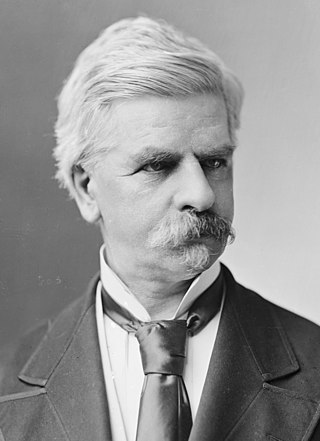
Nathaniel PrenticeBanks was an American politician from Massachusetts and a Union general during the Civil War. A millworker by background, Banks became prominent in local debating societies. He entered politics as a young adult. Initially a member of the Democratic Party, Banks's abolitionist views drew him to the nascent Republican Party, through which he won election to the United States House of Representatives and as Governor of Massachusetts in the 1850s. At the start of the 34th Congress, he was elected Speaker of the House in an election that spanned a record 133 ballots taken over the course of two months.
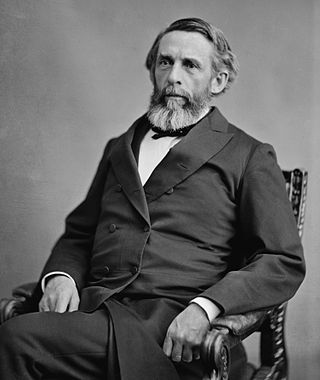
George Sewall Boutwell was an American politician, lawyer, and statesman from Massachusetts. He served as Secretary of the Treasury under U.S. President Ulysses S. Grant, the 20th Governor of Massachusetts, a Senator and Representative from Massachusetts and the first Commissioner of Internal Revenue under President Abraham Lincoln. He was a leader in the impeachment of U.S. President Andrew Johnson, and served as a House manager (prosecutor) in the impeachment trial.
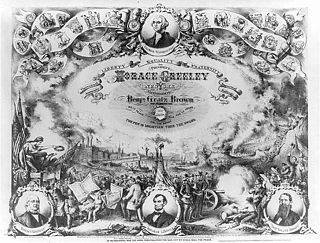
The Liberal Republican Party was an American political party that was organized in May 1872 to oppose the reelection of President Ulysses S. Grant and his Radical Republican supporters in the presidential election of 1872. The party emerged in Missouri under the leadership of Senator Carl Schurz and soon attracted other opponents of Grant; Liberal Republicans decried the scandals of the Grant administration and sought civil service reform. The party opposed Grant's Reconstruction policies, particularly the Enforcement Acts that destroyed the Ku Klux Klan. It lost in a landslide, and disappeared from the national stage after the 1872 election.
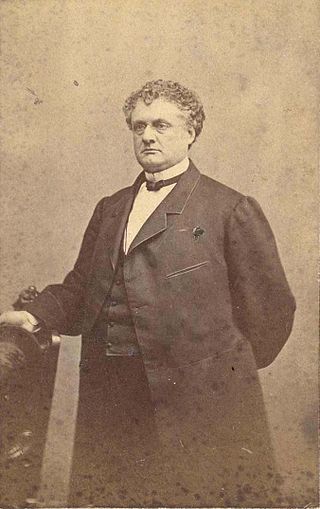
John Albion Andrew was an American lawyer and politician from Massachusetts. He was elected in 1860 as the 25th Governor of Massachusetts, serving between 1861 and 1866, and led the state's contributions to the Union cause during the American Civil War (1861-1865). He was a guiding force behind the creation of some of the first African-American units in the United States Army, including the 54th Massachusetts Infantry.

Henry Laurens Dawes was an attorney and politician, a Republican United States Senator and United States Representative from Massachusetts. He is notable for the Dawes Act (1887), which was intended to stimulate the assimilation of Native Americans by ending the tribal government and control of communal lands. Especially directed at the tribes in Indian Territory, it provided for the allotment of tribal lands to individual households of tribal members, and for their being granted United States citizenship. This also made them subject to state and federal taxes. In addition, extinguishing tribal land claims in this territory later enabled the admission of Oklahoma as a state in 1907.
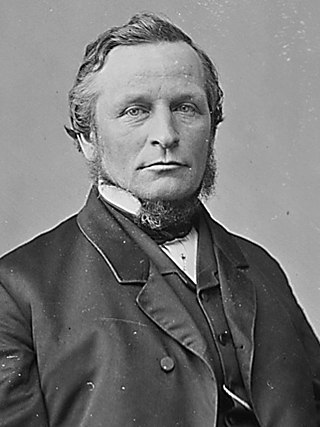
William Barrett Washburn was an American businessman and politician from Massachusetts. Washburn served several terms in the United States House of Representatives (1863–71) and as the 28th governor of Massachusetts from 1872 to 1874, when he won election to the United States Senate in a special election to succeed the recently deceased Charles Sumner. A moderate Republican, Washburn only partially supported the Radical Republican agenda during the American Civil War and the Reconstruction Era that followed.

Lyman Trumbull was an American lawyer, judge, and politician who represented the state of Illinois in the United States Senate from 1855 to 1873. He was an ardent abolitionist who successfully argued the case banning slavery in Illinois, served as a key political ally to Abraham Lincoln, and co-authored the Thirteenth Amendment to the United States Constitution, which abolished chattel slavery. With Lincoln, he founded the Illinois Republican Party. After the American Civil War, Trumbull was a leading moderate Republican, favoring reconciliation with the South and voting against the conviction of President Andrew Johnson on articles of impeachment. He broke with the Republican Party in 1870 to form the new Liberal Republican Party before returning to the Democratic Party in 1872. Near the end of his life, he became a Populist supporter of William Jennings Bryan and served as counsel to Eugene V. Debs.

The 1856 Republican National Convention was a presidential nominating convention that met from June 17 to June 19, 1856, at Musical Fund Hall at 808 Locust Street in Philadelphia, Pennsylvania. It was the first national nominating convention of the Republican Party, founded two years earlier in 1854. It was held to nominate the party's candidates for president and vice president in the 1856 election. The convention selected former John C. Frémont, a United States Senator from California, for president, and former Senator William L. Dayton of New Jersey for vice president. The convention also appointed members of the newly established Republican National Committee.

The Commonwealth of Massachusetts played a significant role in national events prior to and during the American Civil War (1861–1865). Massachusetts dominated the early antislavery movement during the 1830s, motivating activists across the nation. This, in turn, increased sectionalism in the North and South, one of the factors that led to the war. Politicians from Massachusetts, echoing the views of social activists, further increased national tensions. The state was dominated by the Republican Party and was also home to many Radical Republican leaders who promoted harsh treatment of slave owners and, later, the former civilian leaders of the Confederate States of America and the military officers in the Confederate States Army.
The Massachusetts Republican Party (MassGOP) is the Massachusetts branch of the U.S. Republican Party.
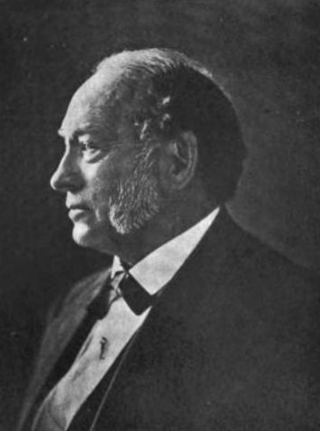
James Scollay Whitney was an American business executive and politician. He was the father of Henry Melville Whitney and William Collins Whitney, founders of the Whitney family business interests.

The Union Club of Boston, founded in 1863, is one of the oldest gentlemen's clubs in the United States. It is located on Beacon Hill, adjacent to the Massachusetts State House. The clubhouse at No. 7 and No. 8 Park Street was originally the homes of John Amory Lowell (#7), and Abbott Lawrence (#8). The houses were built c.1830-40, and they were remodeled for club use in 1896. The clubhouse overlooks the Boston Common, and has views of the Common itself, Boston's Back Bay neighborhood, and the hills to the west of the city.
The 1887 United States Senate election in Massachusetts was held during January 1887. Republican incumbent Henry L. Dawes was re-elected to a third term over opposition from within his own party, led by former Governor John Davis Long.
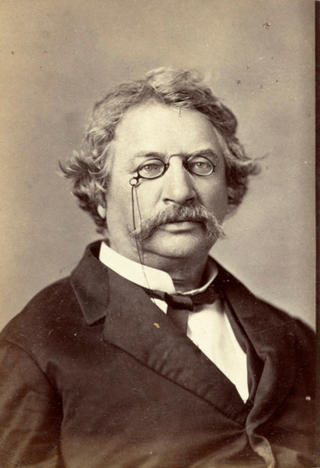
Ensign Hosmer Kellogg was a U.S. lawyer, businessman, and politician. He was a member of the Massachusetts House of Representatives and Massachusetts Senate. In 1850, he served as Speaker of the Massachusetts House of Representatives.

Joshua Bowen Smith (1813–1879) was an abolitionist, conductor on the Underground Railroad, co-founder of the New England Freedom Association, and politician, serving one term as a Massachusetts state legislator. He worked as a caterer in Boston, starting his own business at the age of 36.
The 1857 Massachusetts gubernatorial election was held on November 3. Incumbent Know-Nothing Governor Henry J. Gardner ran for a fourth term in office, but lost the support of the Republican Party, which nominated Speaker of the United States House of Representatives Nathaniel P. Banks. Banks prevailed over Gardner to become the first Republican Governor of Massachusetts.
The 1867 Massachusetts gubernatorial election was held on November 5.
The 1850–51 Massachusetts gubernatorial election consisted of an initial popular held on November 11, 1850 that was followed by a legislative vote that was conducted on January 11, 1851. It saw the election of Democratic Party nominee Emory Washburn. The ultimate task of electing the governor had been placed before the Massachusetts General Court because no candidate received the majority of the vote required for a candidate to be elected through the popular election.